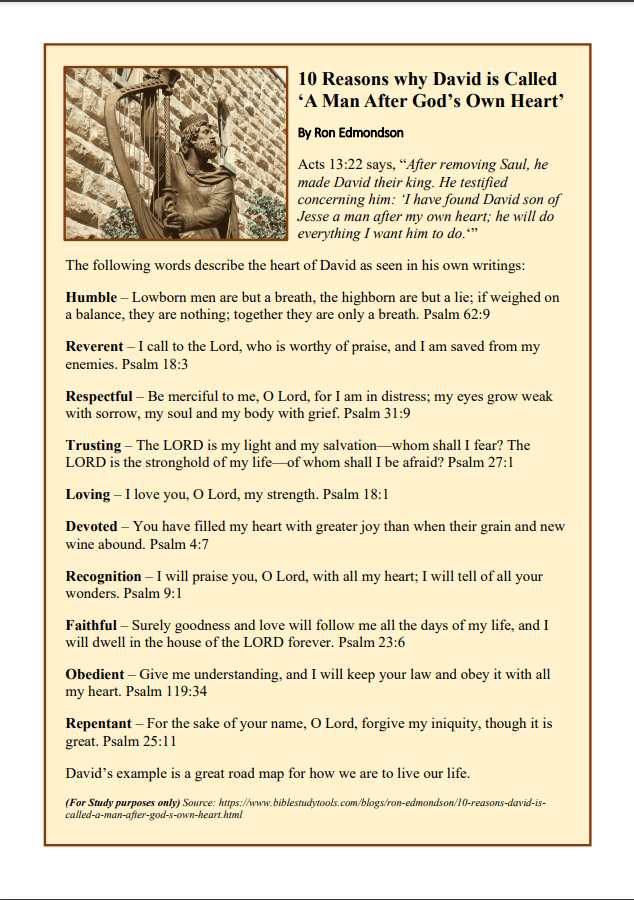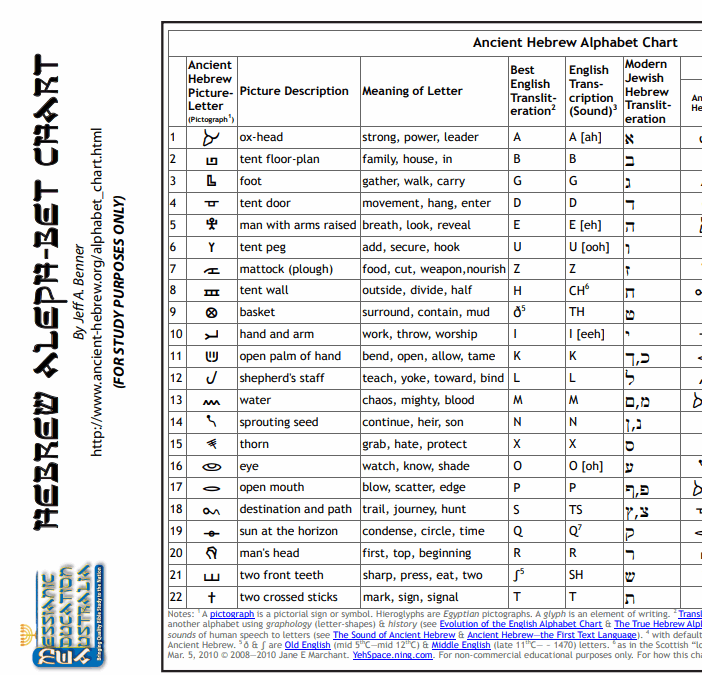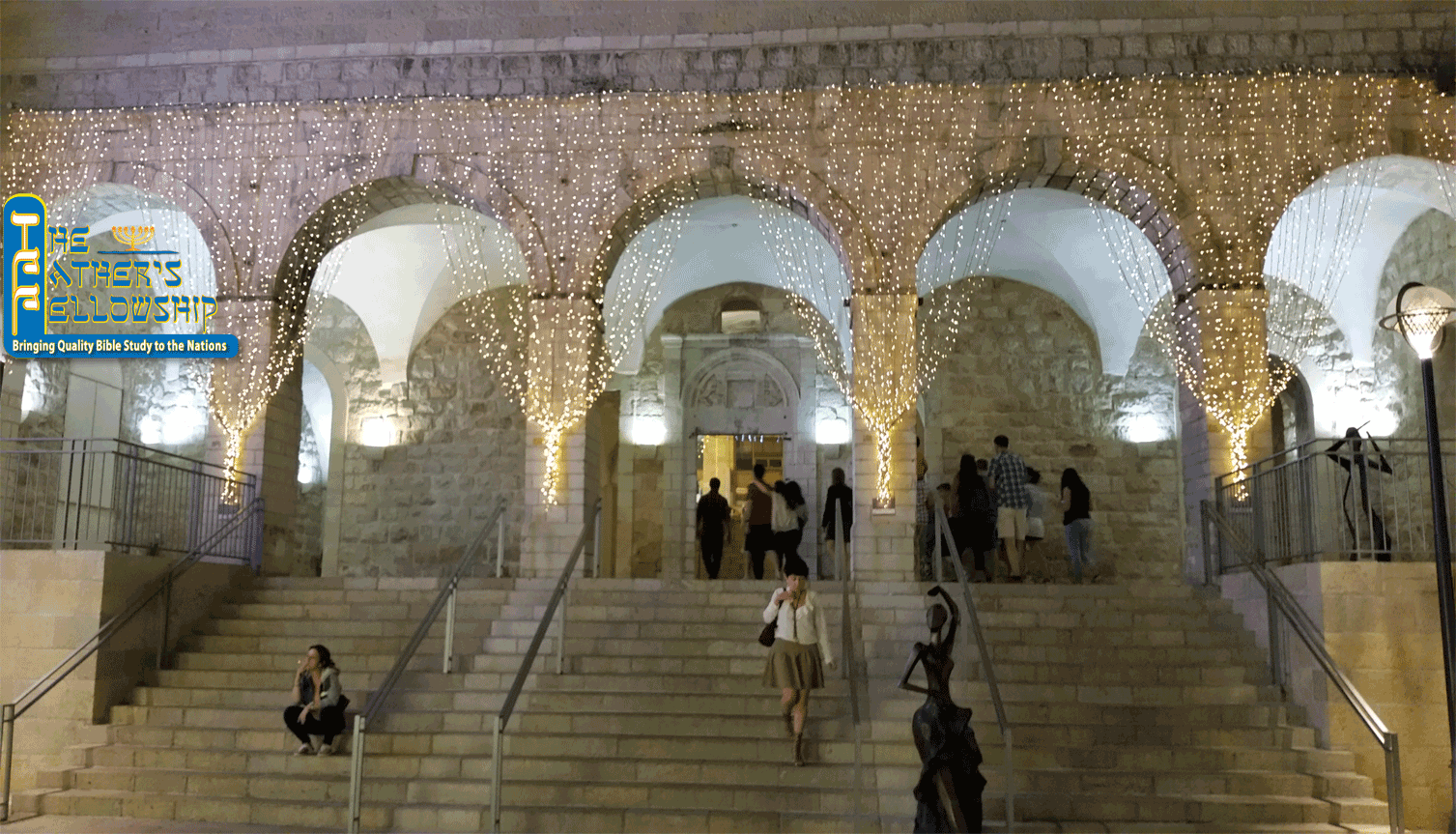
10 Reasons Why David is Called a Friend of God



Checking out the following scriptures bring a broad understanding of what it means to be a priest of God. Whether through Aaron, or through Melchi’zedek, both have similar attributes of: obedience and commitment to God, worship, sacrifice, holiness, and as examples of righteous behaviour. Someone who wants to serve as a Priest of the Most High God must show themselves worthy.
By Natan Ben Yehuda
Rabbi Yeshua teaches the Torah of Moses to the people on the Mount.
Matthew 5:5-20
5 Seeing the crowds, [Rabbi] Yeshua walked up the hill. After he sat down, his talmidim [disciples] came to him, 2 and he began to speak. This is what he taught them: 6 “How blessed are those who hunger and thirst for righteousness! for they will be filled. 7 “How blessed are those who show mercy! for they will be shown mercy. 8 “How blessed are the pure in heart! for they will see God. 9 “How blessed are those who make peace! for they will be called sons of God. 10 “How blessed are those who are persecuted because they pursue righteousness! for the Kingdom of Heaven is theirs. 11 “How blessed you are when people insult you and persecute you and tell all kinds of vicious lies about you because you follow me! 12 Rejoice, be glad, because your reward in heaven is great—they persecuted the prophets before you in the same way. 13 “You are salt for the Land. But if salt becomes tasteless, how can it be made salty again? It is no longer good for anything except being thrown out for people to trample on. 14 “You are light for the world (and people will notice your righteous lifestyle}. A town built on a hill cannot be hidden. 15 Likewise, when people light a lamp, they don’t cover it with a bowl but put it on a lampstand, so that it shines for everyone in the house. 16 In the same way, let your light shine before people, so that they may see the good things {the righteous actions} you do and praise your Father in heaven {because He is influencing your life}. 17 “Don’t think that I have come to abolish the {righteousness of the written} Torah or the Prophets. I have come not to abolish but to complete {and fulfil My Messianic responsibilities as a Rabbi and a Jew, to obey the righteous teaching and doctrines in the Torah of Moses and live out My life wholly in service to Y’HoVaH}. 18 Yes indeed! I tell you that until heaven and earth pass away, not so much as a yud {which is the smallest
letter of the Hebrew alphabet}, or a stroke {which distinguishes one Hebrew letter from another, e.g. a yud y from a vav w {a Hebrew letter} will pass from the [written] Torah — not until everything that must happen {in the physical dimension} has happened. 19 So whoever disobeys the least of these mitzvot {these Torah instructions} and teaches others to do so
{to disobey} will be called the least {in their understanding and practice of the Written Torah} in the Kingdom of Heaven. But whoever obeys them and so teaches {others to also obey} will be called great {in their understanding and practice of Written Torah} in the Kingdom of Heaven. 20 For I tell you that unless your righteousness {in understanding and practicing the Written Torah} is far greater than that of the Torah-teachers [the Scribes] and P’rushim [the Pharisees], you will certainly not enter the Kingdom of Heaven {which is within you}. {Knowing the literal meaning of ‘Torah’ is necessary to grasp the significance of what Yeshua is saying
to the people and why He specifically targets the ‘righteousness’ of the Scribes and Pharisees.
David Stern, author of the Jewish New Testament Commentary, (p.25) defines the meaning of ‘Torah’.
“The Hebrew word ‘Torah’, literally means ‘teaching, doctrine’, is rendered in both the Septuagint and
the New Testament by the Greek word ‘nomos’ which means ‘law’. The Greek has had a more direct
and pervasive influence on English and other modern languages than Hebrew has, and this is why in
most languages, one speaks of the ‘Law’ of Moses rather the ‘Teaching’ of Moses. It is also part of the
reason why the Torah has mistakenly come to be thought of by Christians as legalistic in character (see
Romans 3:20 and Galatians 3:23 below).”
Romans 3:20 “For in his sight no one alive will be considered righteous on the ground of legalistic
observance of Torah commands, because what Torah really does is show people how sinful they are.”
2
Galatians 3:21-23 “
21 Does this mean that the legal part of the Torah stands in opposition to God’s
promises? Heaven forbid! For if the legal part of the Torah which God gave had had in itself the power
to give life, then righteousness really would have come by legalistically following such a Torah. 22 But
instead, the Tanakh [Torah, Writings and Prophets] shuts up everything under sin; so that what had been
promised might be given, on the basis of Yeshua the Messiah’s trusting faithfulness, to those who
continue to be trustingly faithful. 23 Now before the time for this trusting faithfulness {in Yeshua the
Messiah} came, we were imprisoned in subjection to the {Pharisaic} system {of oral-Torah teaching
and doctrines} which results from perverting the {written} Torah into legalism, kept under guard until
this yet-to-come trusting faithfulness {in Messiah} would be revealed.”
{In the famous ‘Sermon on the Mount’ in Matthew 5 and 6, Rabbi Yeshua is encouraging the
people in their walk with God, teaching them ‘righteous’ living from the Written Torah. However, He
knows the religious authorities of the time have a strangle-hold over the people in their daily lives,
compelling them to obey hundreds of extra burdensome ‘less than righteous’ religious laws (known as
the Oral Torah Laws for living), which are not commanded by God in the Written Torah.
Yeshua is explaining that their righteousness before God depends on how well they obey and
teach others the commandments which are actually written in the Torah. The righteousness of the Torahteachers and the Pharisees is lessened because they measure people’s walk with God by how well they
obey and teach others their Oral commandments and traditions, which are not actually written in the
Torah, and in many cases conflict with the Written Torah. Yeshua is encouraging the people to not be
distracted in their walk with God, but keep true to God’s Written Torah because it is directly linked to
the Kingdom of Heaven which demands a code of conduct for loving others and loving God. This is why
Yeshua says the Written Torah can never pass away? Yeshua wants people to follow Him in living the
Written Torah—to live by its ‘righteous’ code of conduct as it affects their standing in Heaven. Yeshua
encourages obedience and lets each person decide for themselves how they will respond to His
teaching.}
[NOTE: Faith in God’s Torah, that is, God’s Word, is fundamental to a Believer’s righteous walk,
presenting themselves holy and righteous before God, in conjunction with the redemptive promise by
God that entrance to the Kingdom of Heaven is inexorably linked to the ‘righteous’ Blood of Yeshua the
Lamb, Who is Torah in the flesh.”]
Matthew 11:18-20 28 “Come to me, all of you who are struggling and burdened {down with the lessthan-righteous ‘Oral’ religious laws of the Scribes and Pharisees}, and I will give you rest {because the
written-Torah of Moses is less burdensome).
29 Take my yoke {which is based only on the written-Torah}
upon you and learn from me, because {as a result of obeying only the writings of Moses} I am gentle
and humble in heart, and you {as my followers} will {also} find rest for your souls.
30 For my yoke is
easy, and my burden is light.”
The following scriptures explain more of the righteousness which inhabits the Kingdom of Heaven:
Luke 17:20-21 20 The P’rushim {Pharisees} asked Yeshua when the Kingdom of God would come. “The
Kingdom of God,” he answered, “does not come with visible signs; 21 nor will people be able to say, ‘Look!
Here it is!’ or, ‘Over there!’ Because, you see, the Kingdom of God is among you {within you}.”
Matthew 18:18-20 18 Yes! I tell you people that whatever you {who are in righteous obedience of Torah}
prohibit on earth will be prohibited in {the Kingdom of} heaven, and whatever you permit {through
righteous judgement} on earth will be permitted in {the Kingdom of} heaven. 19 To repeat, I tell you that
if two of you {who are righteous Believers} here on earth agree {in righteousness} about anything people
ask, it will be for them {as if it were} from my Father in heaven {because it is His Holy Spirit which is
teaching them righteousness}.
20 For wherever two or three {righteous Believers} are assembled in my
name, I am there {in the Kingdom of Heaven} with them.”
(All Scriptural references are from The Complete Jewish Bible, CJB © David Stern)

https://www.messianiceducationaustralia.com/wp-content/uploads/2016/04/07-Hebrew-Aleph-Bet-Chart-1.pdf

Messianic Jews believe Jesus is Israel’s Messiah promised in the Old Testament. But they refute the notion that their Christian belief means they are no longer Jewish, a longstanding view among churches and synagogues. ….
Messianic Education Australia: Copyright © Natan Ben Yehuda 2016
Messianic Jews believe Jesus is Israel’s Messiah promised in the Old Testament. But they refute the notion that their Christian belief means they are no longer Jewish, a longstanding view among churches and synagogues. ….